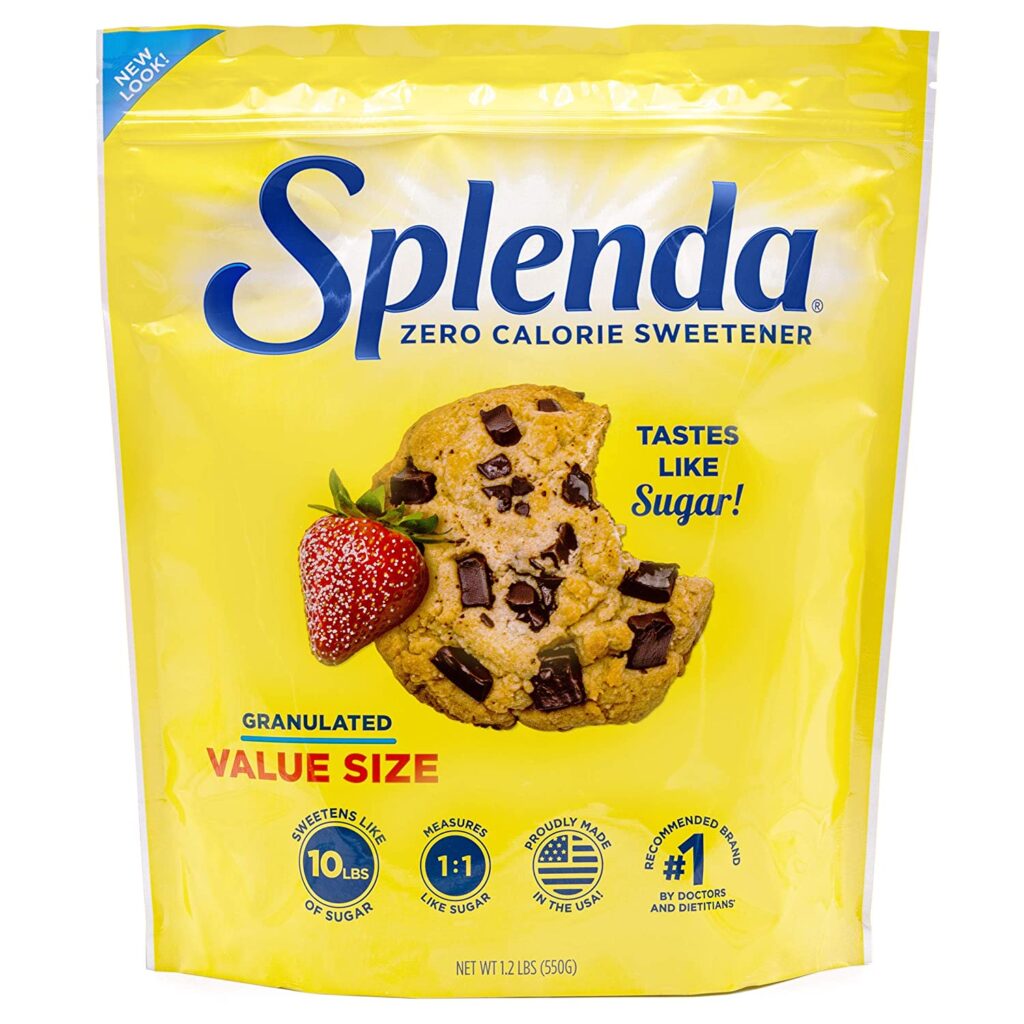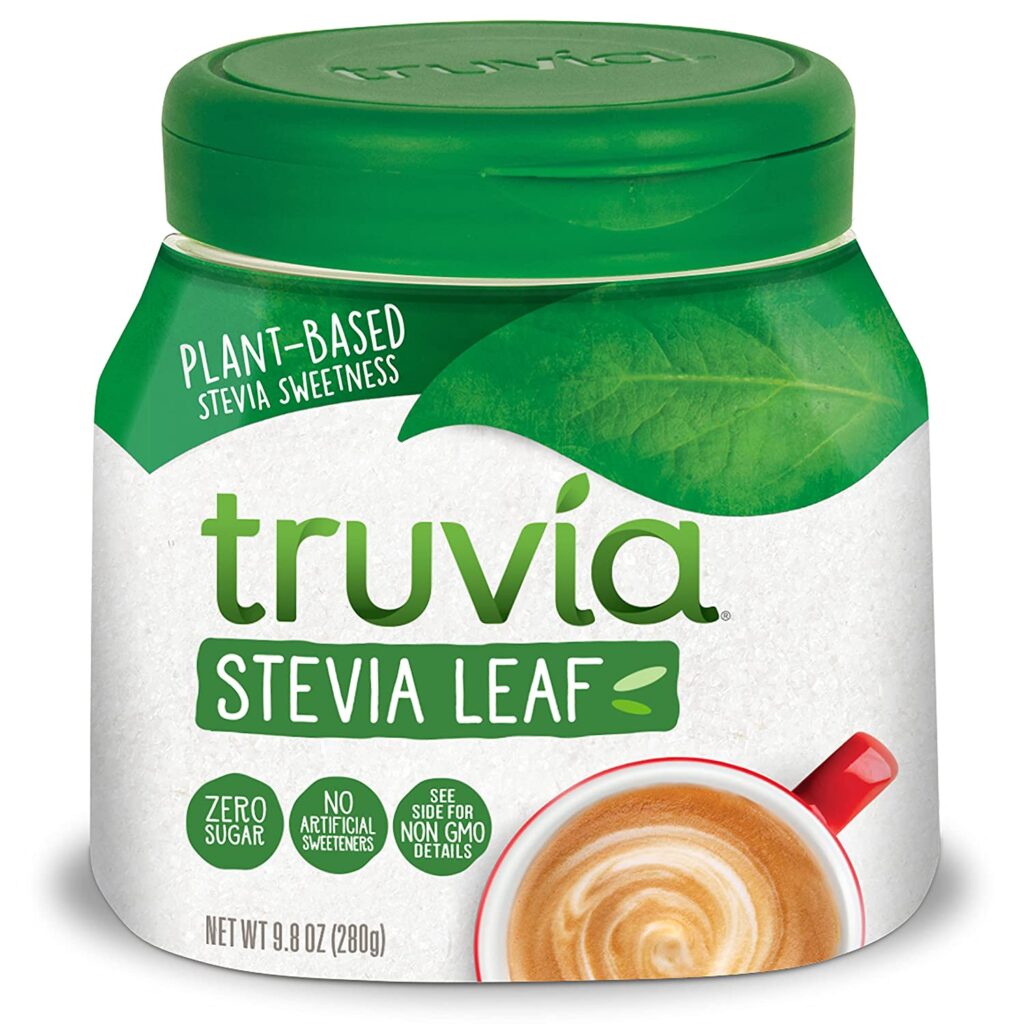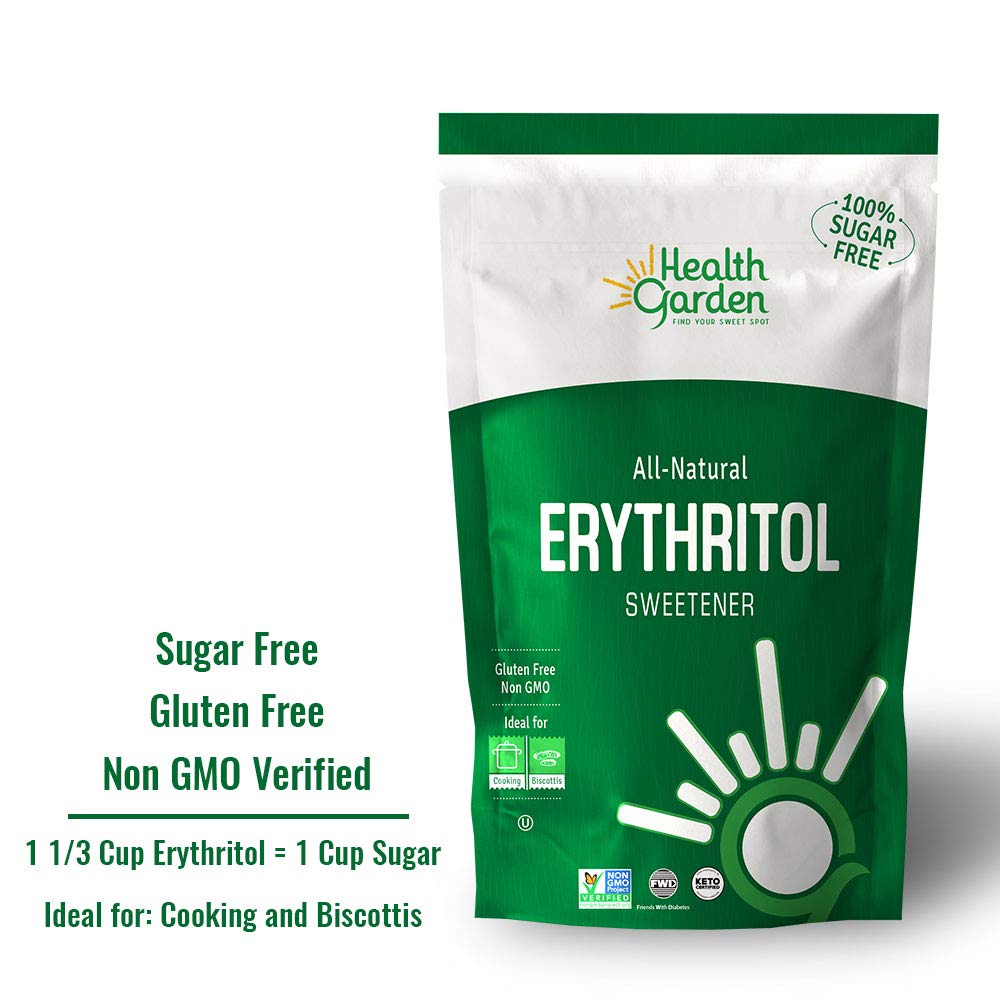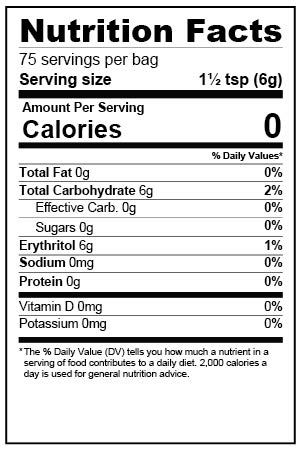We test and review fitness products based on an independent, multi-point methodology. If you use our links to purchase something, we may earn a commission. Read our disclosures.
It’s no secret sugar is in just about everything. We’ve even found it while hunting for the best fish oil supplements, best greens powders, and other “health” products.
Of course, we enjoy a sweet treat just as much as the next person! But as nutrition and health experts, we also understand the not-so-sweet detriments of eating excess sugar—increased risks of obesity, type 2 diabetes, tooth decay, and heart disease, just to name a startling few.
So, are erythritol and other sugar substitutes a wise choice, or is it sweet deceit? Stay tuned as we unwrap the question “What is erythritol?” and its potential health benefits, risks, and uses.
Medical disclaimer: This article is intended for educational and informational purposes only. It is not intended as a substitute for medical advice. For health advice, contact a licensed healthcare provider.
What The Heck Is Erythritol?

Before we get into the nitty-gritty, you might be wondering what the actual heck erythritol is. Well, erythritol is a type of sugar alcohol1–which is also known as a polyol and polyhydric alcohol.
Specifically, erythritol2 is a low-digestible carbohydrate that offers sweetness for little to no calories. This makes erythritol a common sugar replacement used in various products like “sugar-free” baked goods, and even dental hygiene products like toothpaste, mouthwashes, and breath mints.
Some of the best protein shakes even use it to add a little bit of sweetness without adding extra calories.
The sugar alcohol is naturally found in small amounts in certain vegetables, mushrooms, and fruits (like grapes, peas, and watermelon) but is also in fermented foods such as cheese, soy sauce, and wine. For baked goods, mouthwashes, and other commercial products, erythritol is manufactured from other carbs like starch, sucrose, and glucose—still without all the calories.
To put calorie content in perspective, 1 gram of sucrose—the scientific name for table sugar as we know it—provides 4 calories. Despite erythritol containing only 0.2 calories per 1 gram, it still provides about 70 percent of sucrose’s sweetness.
To enhance the sweetness and gain a similar taste to table sugar, erythritol is sometimes blended with other alternative sweeteners. That said, let’s quickly delve into other sugar alternatives on the market.
A Quick Guide to Sugar Alternatives
Sugar alternatives3 are no- to low-calorie artificial and natural sweeteners that have been developed as an alternative to sugars. They are also known as nonnutritive sweeteners (NNS), low-calorie sweeteners, and intense sweeteners.
Collectively, sugar alternatives help enhance the appeal of foods without increasing daily calorie intake. Commonly used sugar alternatives—including artificial sweeteners, novel sweeteners, and sugar alcohols—are also considered to be safe within approved regulations, including those set by the U.S. Food and Drug Administration (FDA).
Artificial Sweeteners

Unlike sugar alcohols not really being a sugar nor alcohol, the name “intense sweeteners” is quite fitting for artificial sweeteners.4 They are said to be 300 to 13,000(!!) times sweeter than sucrose for just a few or zero calories.
These intense sweeteners are used in drinks, dietary products, medications, and mouthwashes. People often turn to these products to limit refined sugar intake, thus helping control body weight and blood sugar levels.
Commonly used and approved artificial sweeteners include:
- Acesulfame potassium (acesulfame-K)
- Aspartame
- Neotame
- Saccharin
- Sucralose
Okay, while artificial sweeteners are not our primary focus we can’t NOT address the elephant on the page: Is the rumor true? Do artificial sweeteners actually cause cancer?
The World Health Organization (WHO)3 compiled data to address this question, observing a 31 percent risk increase of bladder cancer linked to NSS intake. Other studies hint NSS intake increases the risk of cancers unrelated to obesity, while some even suggest they decrease lung and ovary cancers. The WHO hints to take this all with a grain of salt, as these findings were only based on a study or two.
But new 2022 data5 has entered the chat, warning artificial sweeteners—especially aspartame and acesulfame-K—have been associated with increased cancer risk. Even if other supportive research6 is based on animal studies, the American Cancer Society suggests aspartame hasn’t been linked conclusively to any specific health problems, other than for people with phenylketonuria (PKU).
This all said, consumers are encouraged to avoid excessively high amounts of artificial sweeteners. The FDA recommends consuming no more than 50 milligrams per kilogram of body weight per day, which amounts to about 4,550 mg (or 4.5-ish grams) per day based on someone who weighs 200 pounds.
(Also important to remember, artificial sweeteners are intensely sweet, so unless you have the world’s largest sweet tooth, overdoing intake is likely hard to do in daily eating patterns.)
Novel Sweeteners

Novel sweeteners7, also known as natural zero-calorie sweeteners and plant-derived non-caloric sweeteners, are a fairly new subgroup of sweeteners. Well-known novel sweeteners include:
- Allulose
- Monkfruit
- Stevia
- Tagatose
These plant-derived sweeteners provide hybrid benefits of artificial and natural sweeteners—particularly sweetness, without all the unwanted added sugars and calories. They are more comparable to natural sugar sources, like honey and maple syrup, rather than artificial sweeteners that often undergo heavy processing.
Sugar Alcohols
As we described above, sugar alcohols1 are low-digestible carbohydrates also known as polyols. Sugar alcohols are naturally present in certain fruits, vegetables, and mushrooms.
Compared to other sugar substitutes, sugar alcohols tend to not be as sweet and are mostly used as bulk sweeteners. They are often used in combination with other sweeteners to achieve the desired level of sweetness and flavor while
In addition to enhancing sweetness and flavor, sugar alcohols provide texture and help hold moisture in products. They also provide a cooling sensation in the mouth, which helps explain why erythritol is used in some dental hygiene products.
But the fate of sugar alcohols isn’t always minty fresh. They are known for their potent laxative effect and other unpleasant gastrointestinal (GI) symptoms such as flatulence (gas), bloat, and abdominal discomfort when consumed especially in excess.
Rest easy, though, that products containing more than 10 percent of added polyols must include the advisory statement “excessive consumption may produce laxative effects.” Of course, sugar alcohols can still be consumed safely, especially when in low doses or based on your own tolerance, but it’s still wise to know and look out for the common types of sugar alcohols:
- Erythritol
- Isomalt
- Lactitol
- Maltitol
- Mannitol
- Sorbitol
- Xylitol
Wait, does this mean our sugar alternative in the spotlight can cause a bitter belly? Let’s see if erythritol is actually bittersweet.
Erythritol: A Smart Sugar Alternative or a Sweet Lie?

Before we can address whether or not erythritol is a smart solution or sweet deceit, we should first explore the structure and metabolism of the sugar alcohol. This is because such characteristics carry over to how erythritol acts in the body. (Don’t worry, we’ll explain this without all the extra-complicated biochemistry lingo.)
First off, compared to the other sugar alcohols, erythritol is smaller with a lower molecular weight. For instance, erythritol has four carbons while xylitol has five carbons and sorbitol has six carbons.
The size of each is important to know, as it dictates how the sugar alcohols are absorbed. Since erythritol is smaller and weighs less, it can be absorbed into the blood at a higher and faster rate compared to the larger and heavier sugar alcohols.
Once erythritol is in the blood, research2 shows 80 to 90 percent of it is excreted in the urine. The remaining 10 to 20 percent of the unabsorbed erythritol is thought to pass into the colon. (Briefly hold onto this nugget, as it’ll soon unfold into a major benefit of erythritol.)
Benefits of Erythritol
Now that we better understand the structure and metabolism of erythritol, let’s explore how these translate to what we really care about—how it can improve our health.2
Balances Blood Glucose Levels
Simply put, when we eat sugar, the body stimulates a hormone called insulin to absorb it into the blood—hence called “blood sugar” or “blood glucose.” How effectively the body increases insulin levels and absorbs and uses glucose depends on various factors—like the type and amount of sugar consumed, what the sugar was consumed with (such as fiber, protein, and fat), and health conditions like diabetes.
Related: Best whey protein
Compared to glucose, a type of sugar with a glycemic index of 100, erythritol has an index of 0. This means erythritol is not expected, or barely expected, to increase blood glucose levels.
Some evidence suggests erythritol may reduce blood glucose and hemoglobin A1c (HbA1c), which is a blood test that measures average blood sugar levels over the past 3 months. Other data suggests erythritol may reduce or delay glucose absorption in the small intestine, thus helping to balance blood glucose levels.
Managing blood sugar is especially important for people managing diabetes, as uncontrolled diabetes can cause nerve damage, kidney disease, heart attack, and other harmful (and potentially fatal) health conditions. Even for healthy individuals, balancing blood sugar helps keep energy and mood levels steady, hunger and cravings under control, and lower the risk of chronic health conditions like type 2 diabetes.
Promotes Positive Effects on Body Weight

Sugar, especially when refined sugar is consumed in excess, is a main culprit for weight gain for several reasons. To highlight a few, refined sugar essentially provides empty calories and lacks nutritional value, as well as encourages fat storage when insulin is released. The palatability of sugar also makes it pretty easy to overeat—I mean, who can ACTUALLY only eat one Oreo from the package?
Of course, this isn’t to demonize sugar whatsoever, but using low- to no-calorie sugar alternatives can help consumers manage their body weight or weight loss if that’s the goal. And as a refresher, diet and calories are significant factors for losing body fat—and erythritol contains almost 0 calories per gram while sucrose (or “regular sugar”) provides 4 calories per gram.
Shows to Be Well-Tolerated
As a whole, consuming sugar alcohols in excess can cause abdominal bloating, diarrhea, and other undesirable gastrointestinal effects. These effects are due to them being poorly absorbed and also undergoing fermentation in the gut, which causes gas to form.
Erythritol, however, barely reaches the colon and often causes fewer GI side effects compared to the other sugar alcohols in similar doses. Even larger doses of erythritol, or 1 gram per kilogram of body weight per day, are reported to be well-tolerated.
Supports Good Oral Health
Now after you consume that one-plus Oreos, you might feel the sugar coated on your teeth. And it’s not-so-coincidental your dentist has likely encouraged you to brush your teeth after eating, especially after eating sugary foods.
Unlike regular sugar, sugar alcohols might just offer positive impacts on dental health. While sorbitol and xylitol were the first to be studied, erythritol may be more effective for benefiting oral health compared to other sugar alcohols.
A review published in the International Journal of Dentistry8 suggests erythritol can effectively reduce dental plaque and inhibit the growth of harmful bacteria. Such factors can reduce the risk and number of dental decay and caries.
Side Effects of Erythritol
The benefits of erythritol sure seem sweet, but what’s the catch? We’re even surprised to report, well, there hardly is a catch and erythritol side effects are pretty minimal.
That “hardly” mostly tells the entire story about sugar alcohols—and the common undesirable GI effects they produce like nausea, abdominal bloating, and diarrhea. However, as we previously mentioned, erythritol barely reaches the colon and causes digestive issues.
Even if erythritol proves to be well-tolerated, people who have digestive conditions and issues may benefit from reducing its intake. If recommended to a low FODMAP diet, it might be wise to limit erythritol (and other sugar alcohols) altogether—the ‘P’ in FODMAP stands for polyols otherwise known as sugar alcohols.
Overall, though, erythritol has had an impressive safety track record since the early ‘90s. The sugar alcohol is also authorized for food use in over 60 countries, including the United States, Japan, Brazil, Thailand, and Australia.
Erythritol vs Xylitol vs Sorbitol
So, how do three of the popular sugar alcohols stack up against one another? Let’s bite into and compare the common uses, calorie contents, sweetness levels, and sweetest benefits of each thanks to this trusty table.
| Erythritol | Xylitol | Sorbitol | |
| Calorie Content | 0.2 cals/g | 2.4 cals/g | 2.6 kcals/g |
| Absorption | 90 percent absorbed and is mostly excreted in the urine, while the remaining 10 percent travels to the colon and is likely fermented | 50 percent absorbed and excreted, while the unabsorbed 50-percent portion is likely fermented in the colon | 25 percent absorbed and excreted in the urine, whereas the remaining 75-percent unabsorbed portion is mostly fermented by bacteria in the colon |
| Sweetness Level | 0.6-0.8 relative sweetness compared to sucrose (sugar) | 1 relative sweetness compared to sucrose (sugar) and is the sweetest among the sugar alcohols | 0.5-0.7 relative sweetness compared to sucrose (sugar) |
| Most Common Uses | Bulk sweetener in diet food products, candies, beverages, fat-based creams, chewing gums, confection, yogurt, and dental hygiene products | Chewing gum, hard candy, oral health products, cough syrups and drops, and children’s chewable multivitamins | Sugar-free candies, chewing gums, frozen desserts, pastries |
| Claimed Benefits | Virtually calorie-free, unlikely to have a laxative effect, non-cariogenic (does not produce dental calories), low-glycemic response (glycemic index of 1) | Low-cal content, non-cariogenic, low-glycemic response (glycemic index of 12) | Low-cal content, non-cariogenic, low-glycemic response (glycemic index of 9) |
Which Sugar Alcohol Is Best?
While a “best” choice is preferential, we’re going to have to give erythritol the sweet crown here. Yes, all three sugar alcohols contain lower calories than regular sugar, but erythritol is virtually calorie-free while providing greater sweetness than sorbitol—also with claims it doesn’t have an unpleasant aftertaste like other sugar substitutes.
But perhaps the largest factor that swung our decision is based on erythritol’s better overall tolerance compared to other sugar alcohols claimed as “strong laxatives.” I think we all can attest we’d rather not have a bitter belly when rounding up the best product reviews and trying these sweat-inducing running workouts (the only type of “runs” we want)!
Final Thoughts: What Is Erythritol?
Erythritol, a type of sugar alcohol, is a low-digestible carbohydrate. Because it provides a sweet taste with little to no calories, erythritol is primarily used as a sugar alternative.
- While erythritol is naturally found in some fruits, veggies, mushrooms, and fermented foods, most of its intake comes from commercially produced goods.
- Manufacturers use erythritol to enhance the flavor and overall palatability of products. Consumers often use these products to limit sugar intake, balance blood sugar, and control weight.
- Compared to the other sugar alcohols, erythritol shows to be the most tolerated with low risks of causing unpleasant gastrointestinal side effects.
- Erythritol can fit into many different diet types, including diabetic, low-carb, and keto diets.
So, is erythritol a smart solution or sweet deceit? All things considered, especially the low-cal sweetness it offers without spiking blood sugars and causing digestive distress, we think it just might be a smart and sweet selection to fit into a balanced diet.
Q&A: What Is Erythritol?
Is erythritol a good sugar substitute?
Compared to other sugar substitutes, erythritol shows to be well-tolerated without major risk of gastrointestinal discomfort, blood glucose spikes, and other adverse side effects. Also considering erythritol is virtually free of calories, it’s a good sugar substitute to elevate the sweetness, flavor, and overall palatability of various food, drink, and dental products.
Are artificial sweeteners bad for you?
Considering the inconclusive research about the risks of artificial sweeteners, it’s hard to tell the hard facts about whether or not they’re bad for you. However, health and nutrition experts encourage moderating their intake for the utmost safety.
What is the best artificial sweetener?
Just like any blanket suggestion, and because the listed artificial sweeteners above are approved by the FDA, the “best” mostly comes down to its intended use. However, aspartame is the most worrisome for people with PKU.
Is erythritol natural or artificial?
Erythritol is both a naturally occurring and artificial (man-made) sweetener. It can be found in smaller amounts in some fruits, vegetables, and mushrooms but to be cost-effective for mass production, such as in baked goods and dental hygiene products, erythritol is commercially manufactured.
Is erythritol safer than sugar?
Firstly, sugar is not inherently “bad” on its own but can lead to health issues if refined sugar is consumed in excess. Like erythritol is naturally found in fruits and veggies, so do naturally occurring sugars like fructose. But if you’re managing conditions like diabetes or trying to maintain weight, erythritol is considered to be a safe and well-tolerated alternative to sugar.
References
- Grembecka, M. Sugar alcohols—their role in the modern world of sweeteners: a review. Eur Food Res Technol. 241, 1–14 (2015). https://doi.org/10.1007/s00217-015-2437-7
- Mazi TA, Stanhope KL. Erythritol: An In-Depth Discussion of Its Potential to Be a Beneficial Dietary Component. Nutrients. 2023 Jan 1;15(1):204. doi: 10.3390/nu15010204. PMID: 36615861; PMCID: PMC9824470.
- Rios-Leyvraz M, Montez, J. Health effects of the use of non-sugar sweeteners: a systematic review and meta-analysis. World Health Organization. (2022). https://apps.who.int/iris/handle/10665/353064. License: CC BY-NC-SA 3.0 IGO
- Sharma A, Amarnath S, Thulasimani M, Ramaswamy S. Artificial sweeteners as a sugar substitute: Are they really safe?. Indian J Pharmacol. 2016;48(3):237-240. doi:10.4103/0253-7613.182888
- Debras C, Chazelas E, Srour B, et al. Artificial sweeteners and cancer risk: Results from the NutriNet-Santé population-based cohort study. PLoS Med. 2022 Mar 24;19(3):e1003950. doi: 10.1371/journal.pmed.1003950. PMID: 35324894; PMCID: PMC8946744.
- Landrigan PJ, Straif K. Aspartame and cancer – new evidence for causation. Environ Health. 2021;20(1):42. Apr 12. doi:10.1186/s12940-021-00725-y
- Philippe RN, De Mey M, Anderson J, Ajikumar PK. Biotechnological production of natural zero-calorie sweeteners. Curr Opin Biotechnol. 2014 Apr;26:155-61. doi: 10.1016/j.copbio.2014.01.004. Epub 2014 Feb 3. PMID: 24503452.
- de Cock P, Mäkinen K, Honkala E, et al. Erythritol Is More Effective Than Xylitol and Sorbitol in Managing Oral Health Endpoints. Int J Dent. 2016;2016:9868421. doi:10.1155/2016/9868421
Further reading

Check out our Diamondback elliptical 1280ef review for the inside scoop on this sturdy cardio machine. Read more

Here’s your comprehensive Vital Proteins review that covers the popular collagen supplements. Read more

Does pre-workout break a fast? Many fitness enthusiasts practice fasting regularly, but how can you ensure your supplements won't sabotage your efforts? Read more

Learn how to use a treadmill safely and run with proper technique for a successful indoor run or walk. Read more

